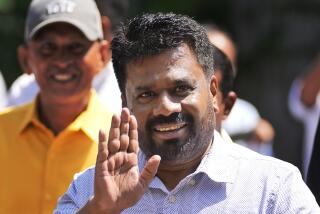Former Prime Minister Returns to Lead Thais
- Share via
HANOI — Former Thai Prime Minister Chuan Leekpai emerged Sunday from four days of back-room power-brokering to regain the helm of a nation reeling from a boom-to-bust economic crisis.
Most analysts said they believed that Chuan’s formation of a new government--a fragile coalition of eight parties--will have little immediate effect in righting Thailand’s free fall. But everyone from foreign investors to Thais themselves breathed a sigh of relief that the country’s political paralysis apparently has come to an end.
During his 28 years in parliament, the 59-year-old Chuan has been untainted by corruption--making him rare among Thai politicians--and foreign investors say he commands a more able team of economists than any of the country’s other parties could offer.
The soft-spoken Chuan returns to a position he held from 1992, when a coalition of civilian parties won power after nearly 16 years of military rule, until 1995, when he was forced to resign amid a land-reform scandal in which he was not directly implicated in wrongdoing.
Chuan replaces Chavalit Yongchaiyudh, who resigned Thursday amid a deepening crisis that has forced Thailand to turn to the International Monetary Fund for a $17.2-billion bailout.
“The country is in crisis now, and it is more severe than some Thais may think,” Chuan said Sunday at a news conference in Bangkok, the capital.
*
But most Thais are well aware of the calamity. Thailand’s currency and stock market have tumbled, and some economists are predicting that Thailand will have lost 2 million jobs by this time next year.
As the economic and political crisis worsened, the National Assembly appears to have spent four days divvying up Cabinet positions and devising ways to keep power--and said little to convince the public that its prime concern was anything other than political self-preservation.
Thailand’s crisis began with the devaluation of the currency, the baht, in July after years of free spending that produced one of the world’s fastest-growing economies.
In little more than a generation, Thailand had been transformed from an agricultural backwater to one of Southeast Asia’s economic “tigers.”
But when the bill came due, Thailand couldn’t pay up. Its crisis has spread to other Asian countries, where currencies and stock markets also have fallen sharply. The shock waves have been felt as far away as Wall Street.
Chuan takes power at a time when Thailand, and particularly Bangkok, is facing a plethora of other problems.
The country is battling an AIDS epidemic. Traffic congestion and pollution have turned Bangkok into an urban nightmare. Tourism, one of Thailand’s important sources of foreign exchange, has dropped sharply, and more than 325,000 houses and condos in Bangkok stand empty with no buyers in sight.
More to Read
Sign up for Essential California
The most important California stories and recommendations in your inbox every morning.
You may occasionally receive promotional content from the Los Angeles Times.













